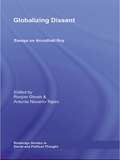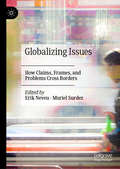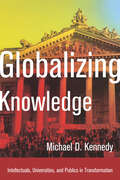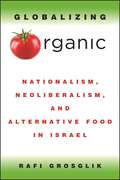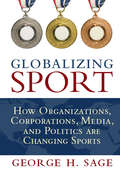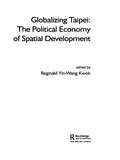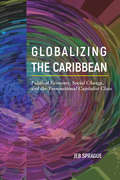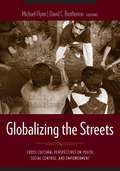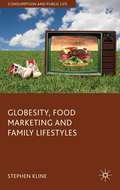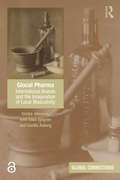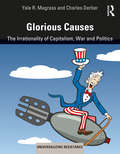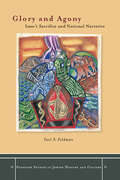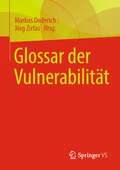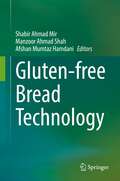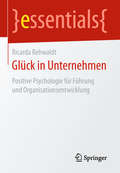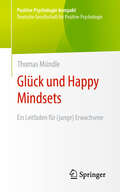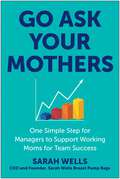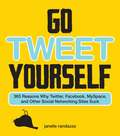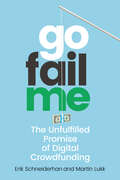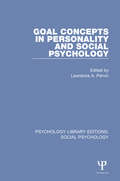- Table View
- List View
Globalizing Dissent: Essays on Arundhati Roy (Routledge Studies in Social and Political Thought)
by Ranjan Ghosh Antonia Navarro-TejeroArundhati Roy is not only an accomplished novelist, but equally gifted in unraveling the politics of globalization, the power and ideology of corporate culture, fundamentalism, terrorism, and other issues gripping today’s world. This volume – featuring prominent scholars from throughout the world – examines Roy beyond the aesthetic parameters of her fiction, focusing also on her creative activism and struggles in global politics. The chapters travel to and fro between her non-fictional works – engaging activism on the streets and global forums – and its underlying roots in her novel. Roy is examined as a novelist, non-fiction writer, journalist, activist, feminist, screenwriter, ideologist, and architect. This volume presents Roy's interlocking network of the ideas, attitudes and ideologies that emerge from the contemporary social and the political world.
Globalizing Issues: How Claims, Frames, and Problems Cross Borders
by Erik Neveu Muriel SurdezThis book is an invitation to question conventional and often misleading visions of globalization. No problem is global by nature: issues are transformed by the action of claims-makers to become ‘problems’ debated in supra-national forums, triggering policy choices and policy transformations. Contributions highlight how health issues, environmental issues and/or political issues are framed as global by a set of stakeholders (scientific experts, bureaucrats, political parties or actors, social movements, social networks, firms). As the volume maps the social logic behind the globalization of problems, it also presents an opportunity for the very cross-disciplinary collaboration it calls for: researchers mobilizing the “agenda-setting” paradigm of issue globalization and those working within the “social constructionist” model are both represented here, providing a unique opportunity to examine the dynamics of globalization from the perspectives of (political, media, economic) sociology, international relations, social movement studies, and beyond.
Globalizing Knowledge: Intellectuals, Universities, and Publics in Transformation
by Michael D. KennedyHeralding a push for higher education to adopt a more global perspective, the term "globalizing knowledge" is today a popular catchphrase among academics and their circles. The complications and consequences of this desire for greater worldliness, however, are rarely considered critically. In this groundbreaking cultural-political sociology of knowledge and change, Michael D. Kennedy rearticulates questions, approaches, and case studies to clarify intellectuals' and institutions' responsibilities in a world defined by transformation and crisis. Globalizing Knowledge introduces the stakes of globalizing knowledge before examining how intellectuals and their institutions and networks shape and are shaped by globalization and world-historical events from 2001 through the uprisings of 2011–13. But Kennedy is not only concerned with elaborating how wisdom is maintained and transmitted, he also asks how we can recognize both interconnectedness and inequalities, and possibilities for more knowledgeable change within and beyond academic circles. Subsequent chapters are devoted to issues of public engagement, the importance of recognizing difference and the local's implication in the global, and the specific ways in which knowledge, images, and symbols are shared globally. Kennedy considers numerous case studies, from historical happenings in Poland, Kosova, Ukraine, and Afghanistan, to today's energy crisis, Pussy Riot, the Occupy Movement, and beyond, to illuminate how knowledge functions and might be used to affect good in the world.
Globalizing Lynching History
by Manfred Berg Simon WendtThe study of lynching in US history has become a well-developed area of scholarship. However, scholars have rarely included comparative or transnational perspectives when studying the American case, although lynching and communal punishment have occurred in most societies throughout history.
Globalizing Organic: Nationalism, Neoliberalism, and Alternative Food in Israel
by Rafi GrosglikGlobalizing Organic focuses on the globalization of a culture of "eating for change" and the ways in which local meanings attached to the production of foods embed ecological and social values. Rafi Grosglik examines how organic agriculture was integrated in Israel—a state in which agriculture was a key mechanism in promoting Jewish nationalism and in time has become highly mechanized and technologically sophisticated. He explores how organic food, which signifies environmental protection and social equity, has been realized in a country where environmental issues are perceived as less pressing compared to inner political conflicts, the Israeli-Arab conflict, and recurrent wars. Based on more than a decade of ethnographic fieldwork, interviews, and analysis of historical documents and media, Grosglik traces how alternative food movements are affected by global and local trends. He covers a wide range of topics, including the ethos of halutzim ("pioneers," Zionist ideological farmers and workers), the utopian visions of the Israeli kibbutz, indigeneity that is claimed both by Palestinians and Jewish settlers in the Gaza Strip and in the West Bank, biblical meanings that have been ascribed to environmental and countercultural ideas, the Americanization of Israeli society, and its neoliberalized economy.
Globalizing Sport: How Organizations, Corporations, Media, and Politics are Changing Sport
by George H. SageSport is enjoyed by millions of people across the world, and both watching and playing sport constitutes a major part of modern leisure time. But sport is also a huge worldwide industry. In Globalizing Sport, George Sage invites readers to explore a deeper understanding of the global dynamics of sport - not only competitions but of the big businesses of money, media coverage, athletic apparel and more. He shows how phenomena such as migration, labour, commerce and politics affect the athletes and the fans, continually reshaping the business and experience of sport. Globalizing Sport puts sport in its political, economic and social context, revealing its connections with businesses, countries, media outlets and education systems.
Globalizing Taipei: The Political Economy of Spatial Development (Planning, History and Environment Series)
by Reginald Yin-Wang KwokTaipei's quest to become a global city is the key to its urban development. Globalizing Taipei looks at this "Asian Dragon", a major city in the South China Growth Triangle and a centre for transnational production, revealing how the development of this capital has received firm state support but is conditioned by international and domestic politics.The book is divided into four parts: economic and spatial restructuring, state and society realignment, social differentiation and cultural reorientation. Each analyzes the interaction of international, state and local politics in the shaping of the city's urban environment since World War II.All contributors to this edited volume are Taiwan scholars presenting critical insiders' views. Based on each author's specialization and research focus, each chapter provides an in-depth consideration of one of Taipei's developmental issues generated by globalization. Collectively they provide broad, insightful and coherent coverage of this crucial time in Taipei's global transmutation.
Globalizing the Caribbean: Political Economy, Social Change, and the Transnational Capitalist Class
by Jeb SpragueThe beautiful Caribbean basin is fertile ground for a study of capitalism past and present. Transnational corporations move money and labor around the region, as national regulations are reworked to promote conditions benefiting private capital. Globalizing the Caribbean offers a probing account of the region’s experience of economic globalization while considering gendered and racialized social relations and the frequent exploitation of workers. Jeb Sprague focuses on the social and material nature of this new era in the history of world capitalism. He combines an historical overview of capitalism in the region with theoretical analysis backed by case studies. Sprague elaborates upon the role of class formation and the restructuring of local states. He considers both U.S. hegemony, and how various upsurges from below and crises occur. He examines the globalization of the cruise ship and mining businesses, looks at the growth of migrant labor and reverse flow of remittances, and describes the evolving role of export processing and supranational associations. In doing so, Sprague shows how transnationally oriented elites have come to rule the Caribbean, and how capitalist globalization in the region occurs alongside shifting political, institutional, and organizational dynamics.
Globalizing the Streets: Cross-Cultural Perspectives on Youth, Social Control, and Empowerment
by Flynn Michael David C. BrothertonThe contributors to this volume examine the struggle for identity and interdependence of these youth, their clashes with law enforcement and criminal codes, their fight for social, political, and cultural capital, and their efforts to achieve recognition and empowerment.
Globesity, Food Marketing and Family Lifestyles
by Stephen KlineThis book examines the public controversies surrounding lifestyle risks in the consumer society. Comparing news coverage of the 'globesity' pandemic in Britain and the USA, it illustrates the way moral panic brought children's food marketing to the centre of the policy debates about consumer lifestyles.
Globetrotting or Global Citizenship?
by Robert Huish Rebecca TiessenGlobetrotting or Global Citizenship? explores the broad range of international experiential learning options available to Canadian students, as well as the opportunities and the ethical dilemmas that come with them. Combining practical advice with critical examinations of international experiential learning, this essay collection is designed to help the reader to move beyond photo-ops and travel opportunities and towards striving for a deeper global citizenship.Globetrotting or Global Citizenship? is a valuable guide for students considering going abroad for experiential learning and a useful resource for those returning from such programs, as well as instructors and administrators facilitating pre-departure and return orientation sessions. Anyone taking part in international volunteering will find the reflections and analysis provided here an excellent starting point for understanding the potential impact of their time abroad.
Glocal Pharma: International Brands and the Imagination of Local Masculinity (Global Connections)
by Ericka Johnson Cecilia Åsberg Ebba SjögrenThe Open Access version of this book, available at http://www.tandfebooks.com, has been made available under a Creative Commons Attribution-Non Commercial-No Derivatives 3.0 license. An exploration of how global pharmaceutical products are localized - of what happens when they become ‘glocal’ - this book examines the tensions that exist between a global pharmaceutical market and the locally bounded discourses and regulations encountered as markets are created for new drugs in particular contexts. Employing the case study of the emergence, representation and regulation of Viagra in the Swedish market, Glocal Pharma offers analyses of commercial material, medical discourses and legal documents to show how a Swedish, Viagra-consuming subject has been constructed in relation to the drug and how Viagra is imagined in relation to the Swedish man. Engaging with debates about pharmaceuticalization, the authors consider the ways in which new identities are created around drugs, the redefinition of health problems as sites of pharmaceutical treatment and changes in practices of governance to reflect the entrance of pharmaceuticals to the market. With attention to ‘local’ contexts, it reveals elements in the nexus of pharmaceutcalization that are receptive to cultural elements as new products become embedded in local markets. An empirically informed study of the the ways in which the presence of a drug can alter the concept of a disease and its treatment, understandings of who suffers from it and how to cure it - both locally and internationally - this book will appeal to scholars of sociology and science and technology studies with interests in globalization, pharmaceuticals, gender and the sociology of medicine.
Glorious Causes: The Irrationality of Capitalism, War and Politics (Universalizing Resistance)
by Charles Derber Yale R. MagrassDrawing on historical cases of the American South before and after the Civil War, Europe – especially Germany – between the world wars, and the United States in Vietnam and its aftermath, this book takes a historical approach to explain the problems of capitalism and democratic leadership in western democracies today. Capitalist democracies proclaim equality, material prosperity and comfort but produce extreme differences in wealth and power. They promise security and peace, but deliver frequent wars. The promises broken, elites often turn to other visions- partially borrowed from feudalism- to win public support. Nations turn to honor, nobility and war as a way of winning over workers and legitimating the capitalist system itself. Capitalism’s contradictions often have produced a cultural divide. One side, "cosmopolitans" – urban, see themselves as citizens of the world, not one region or country – identify as secular, preach multi-culturalism, entertain state welfare systems, and are cautious about going to war. Their opponents, "traditionalists," breed among people who feel left behind, anxiousness and insecurity, often embracing community, tradition, God and family. The devastation of the world wars and the Third Reich led Europe to forgo visions of empire, militarism and glory and focus upon improving the quality of life for their own citizens. Although the United States does not need to experience comparable trauma, they should follow Europe’s example- forget glory and instead build a better life for the American people. The last chapter will consider how such a change could emerge in the US and who might help fight for it.
Glory and Agony: Isaac's Sacrifice and National Narrative
by Yael S. FeldmanGlory and Agony is the first history of the shifting attitudes toward national sacrifice in Hebrew culture over the last century. Its point of departure is Zionism's obsessive preoccupation with its haunting "primal scene" of sacrifice, the near-sacrifice of Isaac, as evidenced in wide-ranging sources from the domains of literature, art, psychology, philosophy, and politics. By placing these sources in conversation with twentieth-century thinking on human sacrifice, violence, and martyrdom, this study draws a complex picture that provides multiple, sometimes contradictory insights into the genesis and gender of national sacrifice. Extending back over two millennia, this study unearths retellings of biblical and classical narratives of sacrifice, both enacted and aborted, voluntary and violent, male and female-Isaac, Ishmael, Jephthah's daughter, Iphigenia, Jesus. Glory and Agony traces the birth of national sacrifice out of the ruins of religious martyrdom, exposing the sacred underside of Western secularism in Israel as elsewhere.
Glossar der Vulnerabilität
by Jörg Zirfas Markus DederichDieses Glossar unternimmt den ersten Versuch, das semantische Feld des Begriffs ‚Vulnerabilität‘ einzugrenzen und die mit ihm verbundenen heterogenen Phänomene in ihren Überlappungen und Wechselwirkungen kenntlich zu machen. Das Glossar ist dabei an einem anthropologischen, phänomenologischen und pragmatischen Verständnis von Vulnerabilität orientiert. Dargestellt und analysiert werden Phänomene, Ursachen und Folgen unterschiedlicher Formen von Vulnerabilität aus unterschiedlichen disziplinären Zugängen. Neben der Vielschichtigkeit und Komplexität und neben den problematischen und positiven Momenten von Vulnerabilität kommen auch pädagogische Möglichkeiten zur Sprache, diese zu bewältigen und zu gestalten.
Gluten-free Bread Technology
by Manzoor Ahmad Shah Shabir Ahmad Mir Afshan Mumtaz HamdaniMarket trend and the increasing diagnoses of celiac disease have encouraged extensive research into the development of gluten-free breads. Generally, the development of bread without gluten involves the use of diverse ingredients and additives aimed at imitating the viscoelastic properties of gluten and consequently obtaining quality bread products. However, developing gluten-free bread remains a technological challenge due to the key role of gluten in the breadmaking process.Gluten-Free Bread Technology provides an overview of all fundamental issues and key factors associated with gluten-free bread technology, with the emphasis on the most recent findings on the subject. The promising results of the reviewed studies indicate that the gluten-free breads developed possess similar or better sensory attributes than those of control formulations, and some are even comparable to their wheat gluten-based counterparts. Chapters of this book focus on the role of additives, dough handling, and the physical, structural, sensory and nutritional properties of the gluten-free bread. The science of gluten intolerance is explained as well. With all relevant literature gathered and summarized in one place, this text will be an essential resource for both food scientists and industry professionals pursuing gluten-free formulations.
Glück in Unternehmen: Positive Psychologie für Führung und Organisationsentwicklung (essentials)
by Ricarda RehwaldtDieses essential liefert einen kurzen und prägnanten Einstieg in die Bedingungen für Glück und zeigt einen systematischen Transfer in den Arbeitsalltag. Dies ist von hoher Bedeutung, denn die Wettbewerbsfähigkeit eines Unternehmens hängt von seiner Belegschaft ab. Untersuchungen haben gezeigt, dass das psychische Wohlbefinden von Mitarbeitenden maßgeblichen Einfluss auf deren Gesundheit, Motivation und Arbeitsleistung hat. Glückliche Mitarbeitende bringen bessere Ergebnisse, sind motivierter, sorgen für ein gutes Klima in ihren Teams und im Kontakt mit Kunden. Trotzdem wurde Emotionen in Unternehmen bisher nur wenig Bedeutung beigemessen, obwohl diese die entscheidende Grundlage für Motivation, Begeisterung und Führung sind. Das essential zeigt, wie sich wissenschaftlich fundiertes Wissen auf den Unternehmenskontext übertragen lässt. Dazu wurde erstmals ein fünfstufiges Modell zur Steigerung des Glücksempfindens in Unternehmen entwickelt.
Glück und Happy Mindsets: Ein Leitfaden für (junge) Erwachsene (Positive Psychologie kompakt)
by Thomas MündleWie wird man glücklich? Indem man ein Happy Mindset entwickelt? Und wie sieht ein solches Mindset genau aus? Welche Formen wurden bisher von unterschiedliche Forscher:innen aus dem Gebiet der Positiven Psychologie beschrieben? Das Buch „Glück und Happy Mindsets“ besticht durch eine gelungene Mischung aus theoretischen Grundlagen und praktischen Übungen, die verdeutlichen, dass das Glück ein menschliches Wachstumsprogramm ist. So kann dieses Buch zu Happy Mindsets dazu dienen, verschiedene Lebenswelten besser zu verstehen, z.B.: · Wie wichtig ist etwa Geld für ein gutes Leben? · Welche Arbeit macht uns besonders zufrieden? · Wie bedeutsam sind menschliche Beziehungen? · Wie kann die virtuelle Welt eine Quelle von (Un-)Glück sein?· Wie könnte eine nachhaltige und gleichzeitig glückliche Lebensweise aussehen? Zielgruppen: alle an Glück und der Positiven Psychologie Interessierten, insbesondere junge Erwachsene und Studierende. Im Grunde kann das Buch jedoch von jedem und jeder mit Gewinn gelesen werden. Zum Autor: Thomas Mündle ist Lehrer und Chief Happiness Officer an der formatio Privatschule und Dozent im Rahmen des CAS Lehrgangs „Positive Psychologie“ der Universität Zürich. Dieses Buch ist das Ergebnis eines Glückskurses, den er über mehrere Jahre hinweg im Gymnasium und als universitäres Wahlfach gelehrt hat.
Glücklich-erfolgreich führen: Führung, durch die alle gewinnen
by Achim PothmannGib deinen Mitarbeitern Tätigkeiten, die sie gerne tun und verhilf ihnen zu Jobglück – und sie werden dich glücklich und erfolgreich machen. Dieser Ratgeber zeigt auf, wie die Steigerung des Jobglücks anderer der eigenen Karriere dienen kann. Die dargestellten Wirkmechanismen basieren auf aktuellen wissenschaftlichen Erkenntnissen aus der Neuropsychologie, Neurobiologie, Positiven Psychologie und angrenzenden Disziplinen, sowie auf zahlreiche lebenspraktischen Fallbeispielen. Sehen Sie selbst, wie sich Erfolg einstellt, wenn eine Führungskraft das Jobglück ihrer Mitarbeiter tatsächlich in den Vordergrund ihrer Betrachtung stellt. Erfahren Sie, welchen fundamentalen Einfluss die Zufriedenheit der Mitarbeiter auf den Erfolg hat und wie sie in Zukunft ein Generalschlüssel für Erfolg sein kann. Erkennen Sie, warum die Haltung der Führungskraft der essenzielle Schlüssel zum Jobglück des Mitarbeiters ist. Dazu stellt der Ratgeber, der auch als Haltungsentwickler bezeichnet werden kann, das Bild von Fred, einem exemplarischen Mitarbeiter vor, mit dessen Hilfe der Leser versteht, dass das Jobglück seines Mitarbeiters eine höchst individuelle und besonders sensibel zu behandelnde Variable ist. Er verdeutlicht, welche Faktoren positiv oder auch störend auf das Mitarbeiterglück einwirken und wie das Führungsverhalten angepasst werden kann. Die anschaulich präsentierten, lebensnahen Beispiele aus dem Arbeitsalltag mit glücklich-erfolgreicher Führung ranken sich um sämtliche Lebensphasen eines Mitarbeiters im Unternehmen, vom Bewerbungsgespräch bis zur Beendigung der Zusammenarbeit. Zielgruppen: Alle an Führung und Jobglück Interessierten, sowie alle Führungsverantwortliche. Zum Autor: Dipl. Kfm. Dr. phil. Achim Pothmann ist Speaker und Berater und begeistert seine Zuhörer und Kunden für eine neue Art der (Zusammen-)Arbeit.
Go Ask Your Mothers: One Simple Step for Managers to Support Working Moms for Team Success
by Sarah WellsFrom a CEO of a multimillion-dollar company that empowers working moms, this guide gives managers an inside look at what mothers really want from their leaders. In a post-pandemic job market, creating a truly mom-supportive workplace is the ultimate competitive advantage. But there&’s a pervasive problem across workplaces big and small: Managers aren&’t asking new mothers what support they need to transition back to work successfully. At the same time, working moms are afraid to ask for help—resulting in poor employment outcomes for both parties. The solution? Intentional and open conversation, which has to start at the managerial level. Go Ask Your Mothers is a guidebook for leaders at every level and in every sector, offering them: An outline of the struggles new working moms face from a lack of proper accommodations to the wide range of mental and physical postpartum challenges Context for why communication problems can arise between managers and moms A road map for initiating successful conversations with new mothers Proven strategies for facilitating successful transitions back to work for new moms Investing in working mothers is more than just a powerful retention strategy; it&’s an investment in your entire organization&’s success. Now more than ever, we cannot afford to lose these highly valuable employees—and, equipped with the right tools, we won&’t have to.
Go Beyond the Job Description: A Step-by-Step Guide to Optimizing Talents, Skills, and Strengths in Organizations
by Ashley PrisantWhat strengths are your employees leaving untapped, and how can you change that? Go Beyond the Job Description introduces the Talent Engagement Optimization (TEO) framework, a 100-day plan that helps HR professionals and managers leverage the skills and capabilities employees already have but don't fully use at work. With step-by-step guidance, the book shows how to increase motivation, productivity and engagement by aligning individual talent with meaningful organizational goals. It features an online assessment to identify your Talent Engagement Zone, plus practical tools like development plans, transition guides and resource kits to ensure long-term success.This is an ideal resource for time-pressed HR managers seeking to do more with what they already have - people included.
Go Tweet Yourself: 365 Reasons Why Twitter, Facebook, MySpace, and Other Social Networking Sites Suck
by Janelle RandazzaFlip Twitter the bird.Tell Facebook to f#@% off.Lose it on LinkedIn.Somewhere between the advent of Facebook and launching Twitter to the masses, the Internet betrayed us. It allowed pages to be viewed by job interviewers, newsfeeds to be flooded by Aunt Julie, and for constant tweets about what color socks that random girl from the study group is going to wear today.This book is the hilarious reply all that says: enough is enough. We don’t want to see the pictures from your business trip to Omaha. We don’t want a page-by-page account of what’s going on in Twilight. We definitely don’t want a virtual drink!When you can’t fix the problem, fix the blame. And since there’s no way in 2.0-hell that you can put an end to the bastardization of the Book, you may as well have a good laugh while pointing the finger at those who ruined their online experience.
Go Ye and Study the Beehive: The Making of a Western Working Class
by Jeannette RoddaFirst published in 2000. More than any other occupation, the long history of mining raises issues of class and dependency, of men, women, and children bound to permanent wage work or forced labor underground with small hope of securing an independent living. Like all popular images, perceptions of workers reveal as much about the nature of the dominant culture as about the complex experiences of workers themselves. The main purpose of this study is to document and analyze the development of working-class culture in the mining camps of the American West.
GoFailMe: The Unfulfilled Promise of Digital Crowdfunding
by Erik Schneiderhan Martin LukkThe gaping holes in the U.S. and Canadian social safety nets mean that many people live in a state of financial precarity that can instantly become untenable in the face of another big expense, such as a large medical bill or damaged property. Historically, people have turned to their communities, neighbors, families, and loved ones for help in these situations. Today, asking for money on the internet through crowdfunding is among the most popular ways of seeking and donating to charity, and for-profit enterprises have realized that tapping into this instinct for helping is extremely good business. GoFailMe reveals how these sites, most notably GoFundMe, enjoy massive revenue, without providing the help they promise. They fail most of their users while putting them through an emotional rollercoaster and using sneaky tactics to obscure that reality. With unprecedented access to interviews, surveys, and hundreds of thousands of crowdfunding cases across North America, Erik Schneiderhan and Martin Lukk take on pressing questions with critical insight: When do we turn to others for help? Who succeeds and who fails in the digital crowd? Whom do these sites benefit? Ultimately, the failure of GoFundMe and others is emblematic of the inability of the for-profit sector and Big Tech to engineer an end to social inequality.
Goal Concepts in Personality and Social Psychology (Psychology Library Editions: Social Psychology)
by Lawrence A. PervinIs behavior motivated? And if so, can it be motivated by the anticipation of future events? What role does cognition play in such motivational processes? And, further, what role does motivation play in ongoing cognitive activity? Questions such as these provide the foundation for this book, originally published in 1989. More specifically, the chapters in this book address the question of the utility of goals concepts in studying motivation and social cognition.
